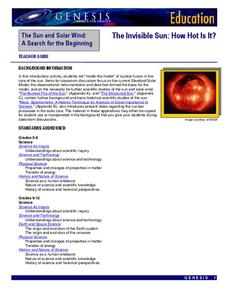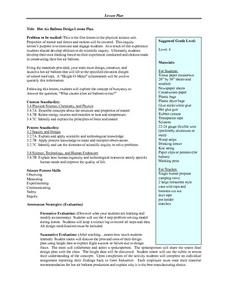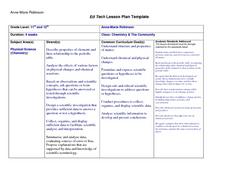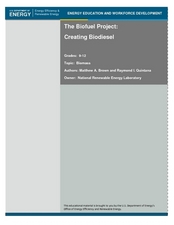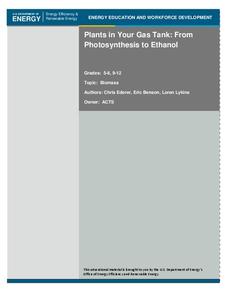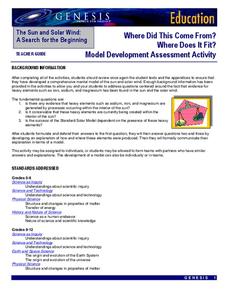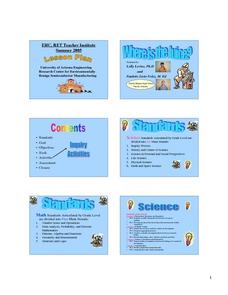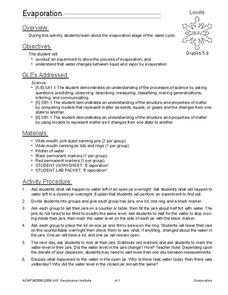NASA
The Invisible Sun: How Hot Is It?
It's getting hot in here! The first in a series of six lessons has learners model nuclear fusion with a simple lab investigation. Groups collect data and analyze results, comparing their models to the actual process along the way.
Curated OER
The Colors of Chemistry
Students investigate the acidity and alkalinity of common household products in an experiment. They use red cabbage juice and litmus paper to show the difference between strong acids and bases as they work with vinegar, dish washing...
Curated OER
Acids and Bases: Together again!
High schoolers identify principles behind acid-base reactions. They predict factors that may affect an acid-base reaction. Students identify questions and concepts that guide scientific investigations.
Curated OER
Hot Air Balloon Design Lesson Plan
Sixth graders discuss what they know and what they want to know about hot air balloon using a KWL chart. They then use a wide array of materials to design a hot air balloon that will lift successfully in cooperative groups referring to...
Curated OER
Chemistry & The Community
Students complete a Webquest which investigates the chemistry in items such as shampoo. They research the Internet, perform a lab experiment, and write a scientific lab report with their findings. Upon completion of the activities, the...
Curated OER
Lead and Mercury Ion Catalase Inhibition
Students participate in a laboratory investigation in which they observe the effect of temperature and pH on enzyme activity. Students also examine exposure to heavy metal ions and the effect that may have on enzyme activity.
University of Colorado
Looking Inside Planets
Researchers use scientific data to understand what is inside each of the planets. The first in a series of six, this lesson builds off of that concept by having pupils use a data table to create their own scale models of the interiors of...
University of Colorado
Looking Inside Planets
All of the gas giant's atmospheres consist of hydrogen and helium, the same gases that make up all stars. The third in a series of 22, the activity challenges pupils to make scale models of the interiors of planets in order to...
Curated OER
The Bio-fuel Project: Creating Bio-diesel
Students investigate bio-fuel. In this investigative lesson, students create bio-fuel from vegetable oil waste. Students will analyze, predict, collect and synthesize data from their experiments with bio-fuel.
NASA
Atoms, Elements, and Isotopes
Rings and golden nuggets contain the element gold, but how small can you break it down before it is no longer considered gold? A helpful presentation explains the basics about atoms, elements, and isotopes through a presentation.
Curated OER
Plants in Your Gas Tank: From Photosynthesis to Ethanol
Explore ethanol and how it is produced. Young scientists investigate photosynthesis and fermentation to the concept of conservation of energy and mass. They discuss the environmental and economical benefits of ethanol as a fuel additive.
University of Colorado
Happy Landings: A Splash or a Splat?
Huygens spacecraft landed on Saturn's moon Titan in 2005, making it the farthest landing from Earth ever made by a spacecraft. In this hands-on activity, the 12th installment of 22, groups explore how density affects speed. To do this,...
Curated OER
Using Thin Layer Chromatography To Identify amino Acids In Solution
Students will work in groups to design and conduct an experiment to identify amino acids found in an unknown solution. This lesson is taught in three sections: (1) Introduction to chromatography (2) Experimental design session (3)...
Curated OER
Volume of Gas
Eighth graders investigate the effect of temperature on the volume of a gas in a closed container. They measure the height of the water in their beaker/container, conduct their experiment, and create a graph to illustrate their data.
Curated OER
How can pH be used to determine possible product tampering?
Students investigate the strength of acids and bases experimentally. They answer the question, "How can pH be used to determine possible product tampering?" by testing acids and bases with litmus paper.
Curated OER
The Case Of The Sour Employee
Ninth graders are presented with a problem that has to be solved. The scenario is a mystery that is purely hypothetical. This does draw on the knowledge of previous lessons. The lesson plan contains background knowledge explaining the...
Curated OER
Air Is All Around Us!
Learners design an instrument to show that air is all around. In this air lesson plan, students research, construct, and present a design that proves that air is all around, even though they can't see it or touch it. A teacher and self...
American Chemical Society
The Discovery of Fullerenes
Carbon is the most common element on earth, so the innovative discovery of a new type of carbon molecule won the 1996 Nobel Prize. In the ready-to-go lesson, scholars learn about C60 and how it has opened up the entire area of...
NASA
Model Development Assessment Activity
Time to show off what they've learned! The final lesson in the series of six asks young scholars to process their learning from the previous lessons. They identify possible elements of the sun as well as a possible origin.
Curated OER
Where Is The Juice?
Students are introduced to the component's of Ohm's Law. In groups, they practice their problem solving skills by reviewing problems solved earlier. They participate in activities that help them gather information on the importance of...
Curated OER
Acoustical Science
Students explore musical instruments and the pitches and tones they make. In this acoustical science instructional activity, students create their own string instruments and explore how pitch is altered.
Curated OER
Sometimes, solid + liquid = gas
Third graders experiment with common household liquids and solids. In this chemical reaction lesson, 3rd graders discuss phase changes and experiment to find other ways to create gases. They use water, vinegar, lemon juice, flour, baking...
Curated OER
Introduction to AP Chemistry
Students are introduced to concepts in an AP Chemistry class. They work together to complete experiments on different materials. They discuss the results of the experiments.
Curated OER
Evaporation
Students study the evaporation stage of the water cycle. In this water cycle lesson, students participate in an experiment to study the process of evaporation that uses jars and water. Students complete an observation worksheet for...


